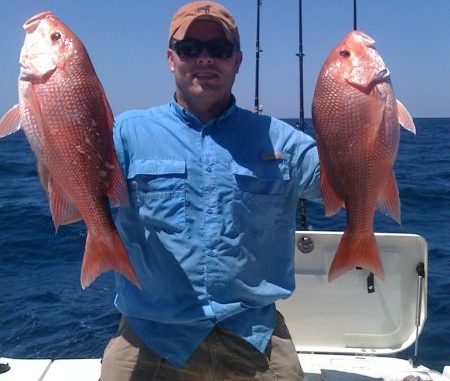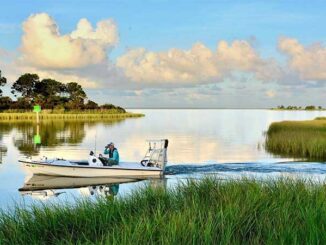
Bill sponsored by Sen. David Vitter, Rep. Bill Cassidy would also give states more Gulf waters for fisheries management, energy resources
Members of Louisiana’s congressional delegation have introduced the Offshore Fairness Act to extend the Bayou State’s jurisdiction in the Gulf of Mexico and solidify its position on the management of the red snapper fishery. The proposal from Sen. David Vitter (R-Metairie) and Rep. Bill Cassidy (R-Baton Rouge) would also apply to other coastal states stretching from Louisiana to Virginia.
If successful, the legislation would push the boundary from three miles to roughly 10 miles. That is already the case for eastern Florida and Texas, which already have jurisdiction over three marine leagues, the equivalent of 10.357 miles.
The bill would give the same rights and privileges to Alabama, western Florida, Georgia, Louisiana, Mississippi, North Carolina, South Carolina and Virginia.
“The bill doesn’t only grant states’ rights to energy resources with additional property rights,” Vitter said, “it also gives them exclusive fishery management authority over reef fish within the new boundary.”
By expanding the boundary of the submerged land of the Outer Continental Shelf to 10 miles, the states would gain rights to additional energy resources in their new territories, although the proposed legislation makes no changes to existing oil and gas leases in these waters.
While the idea of additional revenue through newly acquired Gulf energy prospects might be attractive to the state, Vitter’s and Cassidy’s bills touch upon a stickier topic by wading into fisheries issues. The planned bills bring Louisiana’s congressional delegation into the red snapper debate that has been simmering chiefly on the state level over the past couple years.
The National Oceanic and Atmospheric Administration, which is tasked with conducting scientifically based fishery stock assessments that have been under fire in Louisiana, has incrementally been shrinking the Gulf of Mexico’s recreational red snapper seasons over the years.
NOAA recently announced that the federal season off Louisiana’s coastline could be chopped to just nine days — down from 194 days in 2004 — this year after the Louisiana Wildlife and Fisheries Commission approved a weekend-only state season that began in late March and will extend through September. LWFC members also claimed fisheries authority out to three leagues, but the federal government has not approved that change.
Recreational groups, anglers, charter boat captains and lawmakers argue that Gulf red snapper stocks are strong enough to support more fishing, despite the shorter seasons ordered up by the federal government.
Cassidy said he got involved because he wanted to prevent Washington from interfering with Louisiana fisheries.
“We have heard countless instances of the federal government miscounting fish populations in the Gulf of Mexico and southern Atlantic Ocean,” Cassidy said. “This impacts how long fishing seasons last every year and, thus, the success of commercial fishers and recreational anglers.”
Additionally, Louisiana Department of Wildlife & Fisheries Secretary Robert Barham recently asked the Gulf of Mexico Fishery Management Council to allow the state to take over management of the red snapper fishery, but was denied.
“We have said time and again that there is no one-size-fits-all approach that will work for the entire Gulf Coast when it comes to recreational fishing, which is why we proposed state-by-state or regional management,” Barham said. “The approach of the Gulf Council is outdated and stagnant.”
In defiance to NOAA’s refusal to discuss regionalized fisheries management, the state LWFC created the Louisiana-only recreational red snapper season and set the recreational bag limit at three fish per day at a 16-inch minimum. The federal daily limit, as stated in a regulations guide updated in January, will be two red snapper per angler when the federal season opens June 1.
Texas currently has its own red snapper regulations, as well. Alabama and Mississippi, meanwhile, remain in compliance with federal regs.
Given the federal government’s “abysmal management of the red snapper fishery,” Vitter said he wanted to make sure his bill extended jurisdiction of that resource as well — up to 200 miles off the states’ coasts.
“Allowing these coastal states to regulate their own natural and commercial offshore resources in the extended jurisdiction will help alleviate financial troubles and allow a much more local approach,” Vitter said.
His bill would put the states in charge of red snapper management until each state’s governor certifies that NOAA’s stock assessments are “complete and based on sound science.”
Vitter has been pushing some version of the Offshore Fairness Act for the past several years, sometimes teaming up with Democrats for a bipartisan approach.
Away from Capitol Hill and in the state Legislature, which convened its regular session Monday, state Sen. Bret Allain (R-Franklin) is trying to bring attention to the issue with Senate Bill 157 that would prohibit the harvest, sale and transportation of red snapper in Louisiana waters.
Asked if the bill was a threat or a promotional tool to talk about the issue, Allain offered no direct answer.
“I couldn’t imagine not having this resource available for future generations of Louisianans,” he said in an interview before the session started, “and I will do everything in my power to restore the snapper fisheries as soon as possible for everyone to enjoy.”

